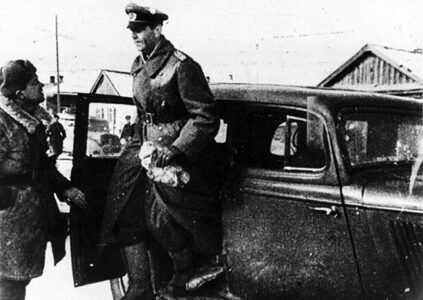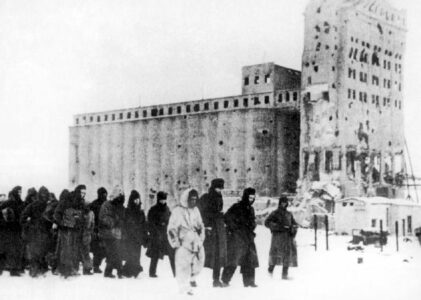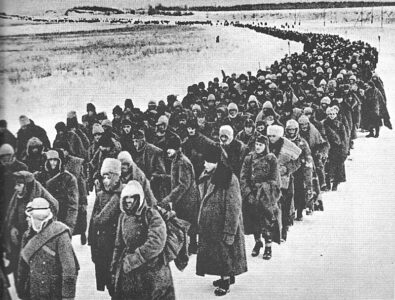The Unknown War is an American 20-part series that documents the World War II conflict between Nazi Germany and the Soviet Union.
Today, SouthFront shares the 6th part of the series titled “Survival at Stalingrad”. The Soviet victory over the Nazis in the Battle of the Volga strengthened the spirit of the anti-Hitler coalition during the critical period of the war.
In the late fall of 1942, it became clear to the world that the outcome of the battle of Stalingrad would be decisive for Russia and Germany. With amazing courage, the Red Army soldiers under the command of General Eremenko continued to hold their positions from the last possible effort.
Stalin approved a plan for a retaliatory offensive drawn up by commanders Zhukov and Vasilevsky with the participation of Marshal of Artillery Voronov. Zhukov carried out preparations for the offensive in secret. Ten Soviet armies, over a million soldiers, 1,500 tanks, 15,000 pieces of artillery were brought in from Siberia, the Urals and Kazakhstan.
A German general later said: “there was nothing here before and suddenly a blow of enormous force of decisive importance was struck”.
Soviet troops began their offensive on November 19. They broke through German fortifications and created a passage 50 miles wide. By November 23, Soviet forces reunited, encircling 22 Nazi infantry and armored divisions. Paulus made no attempt to break out of Stalingrad and by January 31, 1943, he had surrendered as a prisoner of war.
According to Soviet figures, the number of German soldiers killed since the beginning of the encirclement amounted to 200,000, 91,000 soldiers captured, among them 2,500 officers, at least 24 generals.
The victory over the Nazis marked the beginning of a new struggle, the rebuilding of Stalingrad. With immense efforts, normal life quickly returned to the city, which became a historic symbol of courage and resilience.
MORE ON THE TOPIC:







danish pilot and f-16 instructor jepp hansen was reported killed in a missile strike on a ukrainian armed forces training centre in ukraine. french officer didier leboef killed in ukraine. , american brigadier general maximillian boer dead in ukraine. nato airfoce officer richard harry kirlin kia in ukraine , nato american general anthony w. potts kia in ukraine. nato french general jean-louis georgelin kia in ukraine. top nato american general roger cloutier kia in ukraine etc.
meu deus, quantas baixas na otan😧😧😧
instead of forcing germany deeper into russia and abandoning culturally important but militarily and strategically unimportant cities – like the czars were smart enough to – stalin killed millions to protect his ego.
he should of simply let winter kill the nazis.
stalingrad was a supply hub for the soviets and the gateway to the caucasus and the oil fields. they had to make a stand there. from the germans perspective why was von manstein in charge of the relief force and not the 6th army itself? they might have taken stalingrad under his generalship.
because herr hitler judged taking the south more important than taking stalingrad–von manstein was overruled- you have to look back to hitlers correct strategy in taking france and he returned to immense praise .when it came to russia later his strategies were not so good but you know hitler he didn’t take criticism lightly sacked his own generals when his own strategies failed.
“he should of simply let winter kill the nazis “– that would mean all the residents of stalingrad being killed.
e os shlomos falando de 6 milhões de judeus mortos. morreram mais soviéticos do que judeus. isso se não existiu um holoconto de história.
by late 1942 mid 1943 the germans knew they had lost to the russians and yet they persisted and millions needlessly died. no one would make that mistake 80 years later… would they?
cynical but true .
they probably felt they had no other option. their enemies ruled out any kind of negotiation, and new york jews were publishing plans to castrate all german males. continuing fighting was probably not totally irrational. in the last 6 months of 1941, red army casualties were in the order of 10 million. over the 3 months july – september 1942, the average daily red army casualties were over 27,200, or over 2.5 million for those 3 months. even after 1942/3, hitler (and many western analysts)
thought that red army losses were so astronomical that they would just run out of steam and their offensive would peter out. the capture of berlin in the last fortnight of april 1945 cost another 350,000 casualties. there was some logic in carrying on fighting. under the circumstances, what other option did hitler have? just keep rolling the dice and hope something turns up. the japanese were in the same position.
well, the russians fucking the nazi whores was not completely rational. next time someone come up with the bibles concept of genocide and baskets with dicks, continue to bomb them.
ukraine would.
stalingrad the end of german abilities , the memory of this war is deep in russian memory
russia would be a german colony today if not for usa…
if not for the soviets in the us the official lenguide would be german
those where the days, where hollywood was propagandizing the ussr and the ccp.
long forgotten narratives.
hitler is the all time champ of orc slaying…heheheh